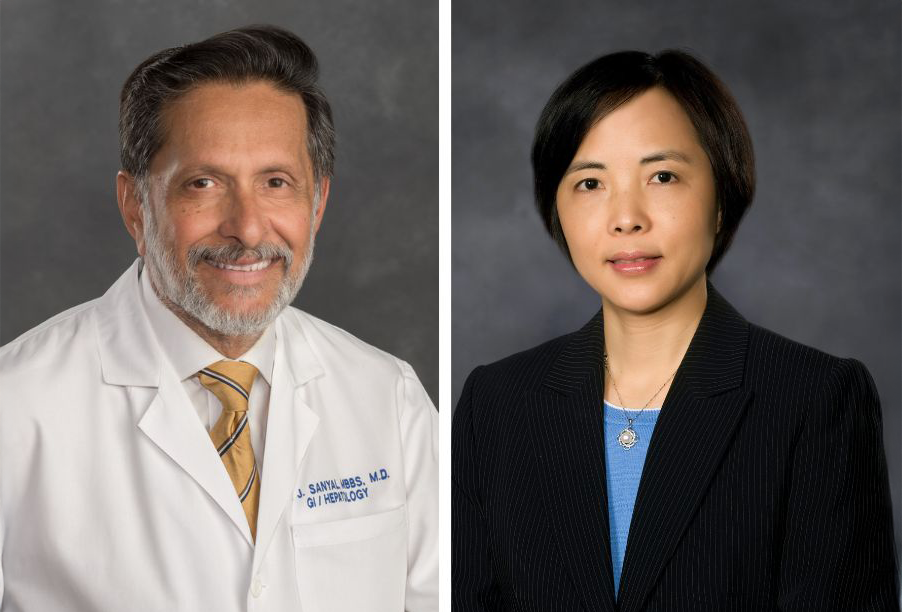Director Sanyal leads study in broad attack by VCU on liver cancer
 Liver cancer is the third most common cause of cancer deaths worldwide, in part because it’s often found too late, when treatment options are limited. Current treatments, such as immunotherapy and a type of drug called TKIs, don't work for everyone. In fact, many people with liver cancer stop responding to these treatments after a while.
Liver cancer is the third most common cause of cancer deaths worldwide, in part because it’s often found too late, when treatment options are limited. Current treatments, such as immunotherapy and a type of drug called TKIs, don't work for everyone. In fact, many people with liver cancer stop responding to these treatments after a while.
A group of VCU scientists connected with the Massey Comprehensive Cancer Center recently received over $13 million from the National Cancer Institute to look for new treatments to fight liver cancer. The five-year, P01 grant will initiate a multi-pronged approach to better understand the biology of liver tumors and advanced treatment options for liver cancer. The long-term goal of the entire grant effort is to move findings from at least one, if not all, of these projects forward into a clinical trial.
“There are no other large, grant-funded projects like this in the country for obesity-associated liver cancer; it has the potential to change the way the disease is treated,” said Devanand Sarkar, Ph.D., the principal investigator on the grant, as well as associate director of cancer research training and education coordination and member of the Cancer Biology research program at Massey.
The group includes the Institute’s director, Arun Sanyal, M.D., a member of Massey’s cancer biology research program, who has studied the relationship between high-sugar, high-fat diets, the development of MASH and liver cancer growth. His recent findings include identifying a role of the MYC gene in regulating liver cancer associated with metabolic dysfunction-associated steatohepatitis or MASH.
“Our hope is that in the long run, this research will improve the lives of millions of people around the world who are at risk for liver cancer, helping them avoid this deadly disease and offering new hope for a cure,” Sanyal said.
Joining Sanyal in this project by Huiping Zhou, Ph.D., another member of Massey’s cancer biology research program, whose work seeks to clarify the role of bile acids in liver cancer.
The Sanyal-Zhou effort will examine how obesity, which commonly leads to MASH, and poor diet can lead to liver cancer. They will explore a new approach: using a special drug that blocks MYC, which plays a big role in helping liver cancer grow. The team will test whether this MYC-blocking drug, combined with other treatments, can slow down or even stop liver cancer.
When liver cancer is caught early, doctors can remove the tumor or even perform a liver transplant. However, most of the time, liver cancer is found too late, when the tumor has grown larger and spread to other parts of the body. This makes it much harder to treat.
Liver cancer is becoming one of the most common causes of cancer deaths around the world. One of the major reasons for this rise is a liver condition known as Metabolic dysfunction–associated steatotic liver disease (MASLD), where extra fat builds up in the liver.
MASLD can lead to a more serious condition called metabolic dysfunction-associated steatohepatitis or MASH, which causes liver damage, scarring, and, in some cases, liver cancer.
Researchers have learned that liver cancer, known as hepatocellular carcinoma or HCC, doesn’t happen for just one reason. It is often caused by a combination of genetic and environmental factors, such as diet, lifestyle, or exposure to toxins.
A gene change called PNPLA3 I148M is a well-known risk factor, but researchers still don’t fully understand how it leads to liver cancer. This project aims to figure out how this gene change works so that better treatments can be developed.
The Sanyal-led study will focus on three main goals:
- Understanding how the PNPLA3 I148M gene change leads to cancer by affecting certain molecules in liver and immune cells.
- Learning how these changes cause more inflammation and make liver disease worse.
- Testing new treatments in mice to see if blocking harmful molecules can stop cancer from developing.
Sanyal and Zhou also want to learn more about the role of bile acids, which help digest fats but can be unbalanced in people with NASH. Scientists believe this imbalance is an important factor in the development of liver disease and cancer, especially in people with the PNPLA3 I148M gene variant.
Sanyal says this project has the potential to lead to major breakthroughs in our understanding of liver cancer, especially for people with MASLD and MASH who have the PNPLA3 I148M gene variant. By identifying the exact processes that cause cancer in these patients, scientists can develop new therapies that target those specific pathways.
For people who have a high risk of liver cancer, this research could lead to treatments that prevent the disease before it even begins. And for those who are already suffering from advanced liver disease, it could open the door to new, more effective treatments that specifically address the genetic and molecular causes of their condition.